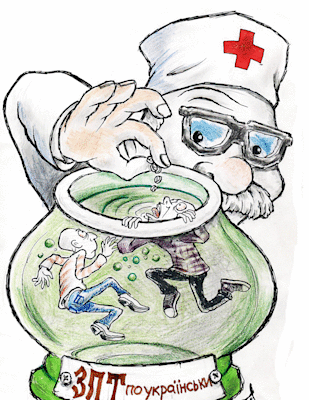Activist Pavel Kutsev from the Rising Voices grantee project the Drop-In Center has been active in raising awareness about substitution therapy programs in his country of Ukraine. In addition, he has become very interested in how these programs are implemented in other countries around the world. In his blog depo3p [ru], Pavel highlights some of these cases, including a recent conversation with the fellow substitution therapy patient from Israel [ru], who told him:
«У нас в Израиле метадоновые программы стараются избегать. Самая большая вероятность в них угодить, это если попасть в тюрьму. Действительность выглядит примерно так. … помещают в одиночный бокс. При этом стараются создать такие жесткие условия чтобы исключить малейшую возможность передачи наркотиков. А именно – трое суток никаких передач, свиданий, круглосуточное видеонаблюдение. И на протяжении всех этих дней вас проведывает врач и всё время предлагает… метадон. Многие не выдерживают и уже на третьи сутки сдаются. А что остается делать если жуткий абстинентный синдром?
Pavel also blogged about the similar situation with substitution therapy in China. Before Methadone therapy was introduced in China, he states that there were informational campaigns conducted to state that opiate replacement therapy was just a substitution of one drug for another. He wrote [ru]:
Общество (в том числе и наркозависимые) со свойственным китайцам прагматизмом усвоили – лучше (дешевле) держать на поводке (контролировать) чью-то вышедшую из-под контроля зависимость, чем терпеть и страдать, подсчитывая потери. Метадоновые программы в Китае (как и в других странах) считаются эффективной альтернативой наказанию. Здесь очень серьёзно эксплуатируют главное свойство метадона (которому у нас почему-то не придают должного значения) – блокирование опиатных рецепторов. Что исключает саму возможность дальнейшего употребления всех других наркотиков опиатного ряда, кроме метадона. То есть – мало того, что сам метадон не обладает эйфоричным потенциалом … , так он ещё и сводит к минимуму ЛЮБЫЕ попытки употребления нелегального героина, опия и проч.пд. Наркозависимый практически лишен выбора. Или отказ от наркотиков вообще (что немыслимо для большинства наркоманов в наши времена) или…только метадон. Со всеми свойственными метадону последствиями. Однако, метадоновые программы прежде всего направлены на Снижение вреда, и являются ключевым звеном профилактической модели, направленной на снижение темпов эпидемии ВИЧ , чему способствует отказ от инъекционного употребления… В этом контексте программы оправданы. …
The pragmatic Chinese society in general, including the drug users in particular, accepted the idea that it is better (and cheaper) to control somebody’s addiction than to endure, suffer, and take losses. Methadone programs in China are considered to be an effective alternative to punishments. Here they emphasize the main quality of Methadone (which, for some reason, is not considered much in our country) to block opiate receptors. This illuminates even a possibility to use any other opiate drug besides methadone. So, it is not only that methadone itself does not have any euphoria potential … it also blocks any attempts to illegally use heroin, opium, etc. So a drug user almost does not have any choice. Either he should stop using drugs at all (which in reality is not possible for most addicted people) or to use Methadone only, with all the negative effects which Methadone brings. However Methadone programs are aimed first of all on harm reduction and are a key element of the prevention model focused on the reduction of the HIV/AIDS epidemic through decreasing the injection use of drugs. In this context, such programs are well justified.
Pavel then compares these two experiences with the situation in his home country of Ukraine, where patients can only receive Methadone by personally commuting every day to the clinic, even when the patient is sick. He noted that patients that start therapy become dependent on medical personnel at the site, and will also be under the watch of the police, which does not always have favorable attitudes towards drug users.
There are a pair of cartoons drawn by by Ksenia Z. and Vladimir Lomeyko and published on the Drop-In Center newsletter. The cartoons depict how patients see substitution therapy in Ukraine. The first cartoon presents the replacement therapy as an inflatable life preserver which helps the patient not to drown, but it is not a reliable means for swimming in the sea of life. Pavel commented on the cartoon:
Действительно принимая легальный заместительный препарат, человеку предоставляется шанс не утонуть в океане проблем. Но и доплыть до конкретного берега – будь то работа, учеба, семья – также остается несбыточной мечтой для большинства пациентов. … Отсутствие рецептурной или какой иной формы выдачи ЗПТ для СТАБИЛЬНЫХ пациентов (отказавшихся от употребления нелегальных наркотиков), делает программу не только бесперспективной в плане социального благополучия…
The second cartoon shows how the absence of the provision of Methadone by pharmacies makes the patient totally dependent on the doctors. Pavel noted that those patients that have demonstrated a serious attempt to give up illegal drugs, by testing negative on drug tests for half a year, should have a chance to manage the therapy one's self under the supervision of a doctor. In his opinion, this would provide a stronger incentive for changing one's behavior.





